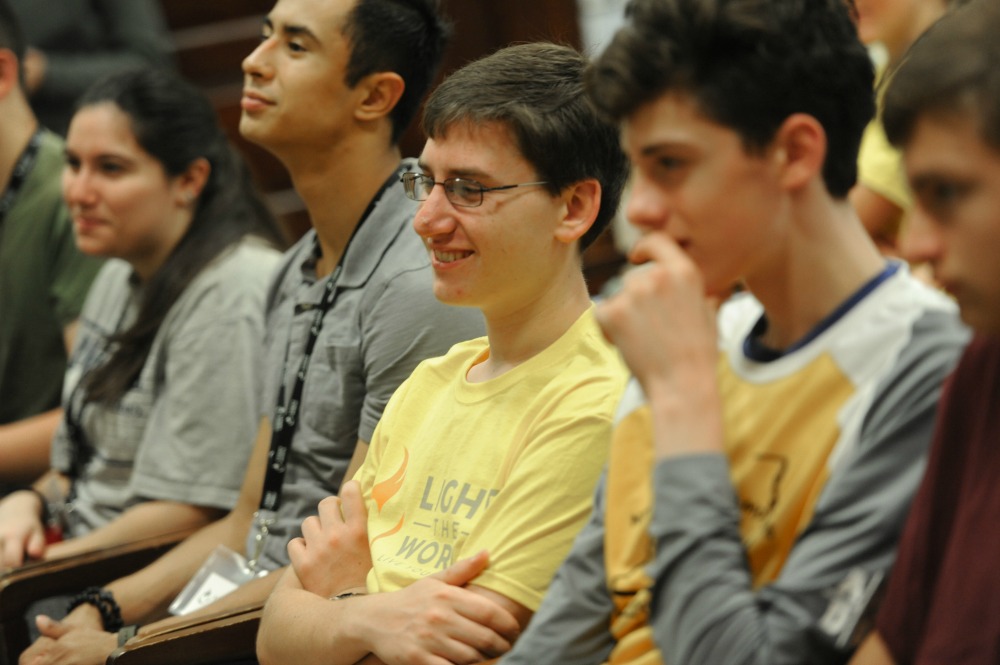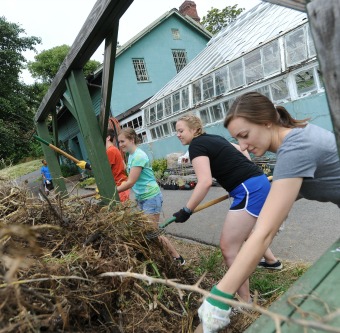

How is faith reflected in the day-to-day lives of working Catholics? That was the question at the core of a recent program hosted for high school students by the School of Theology and Religious Studies at The Catholic University of America. As participants in the University’s first annual Light the World! Institute, more than 54 teenagers from around the country spent a week on campus learning to see theology in everyday life and exploring the nation’s capital.
 During the institute, the students heard talks by University faculty members and professionals who are experts in their fields about how they incorporate faith into areas as varied as science, art, business, politics, and athletics. The students also participated in service activities and took guided trips to the National Gallery of Art, Goddard Space Flight Center, Nationals Park, and the U.S. Capitol.
During the institute, the students heard talks by University faculty members and professionals who are experts in their fields about how they incorporate faith into areas as varied as science, art, business, politics, and athletics. The students also participated in service activities and took guided trips to the National Gallery of Art, Goddard Space Flight Center, Nationals Park, and the U.S. Capitol.
The week began with William Mattison, professor of moral theology, presenting the connection between faith and reason. This provided the basis for theological texts that were read every day including papal encyclicals, pastoral letters, and current news articles. Mattison led a discussion relating theology to all essential questions that people have throughout their lives no matter their vocation or career.
Among other presenters during the week was Jonathan Reyes, executive director of the U.S. Conference of Catholic Bishops Department of Justice, Peace, and Human Development. During his presentation, Reyes spoke alongside Joseph Capizzi, associate professor of moral theology, about the need for Christians to engage in politics in order to foster the common good.
“To engage in politics is a duty as a Christian person; the common good is all our good,” Reyes said. “But I would encourage you to think of it in another way: It’s the opportunity for doing good for others ... It’s an opportunity to change things, to transform things.”
To get more involved in politics, Reyes suggested students “go see” the issues in person by getting to know their neighbors or volunteering. He also advised the teenagers to develop their consciences by learning about the issues, and to practice personal integrity.
“Live up to the things you preach because otherwise no one will believe you,” he said.
Philip Brach, assistant dean of development for the Tim and Steph Busch School of Business and Economics, spoke to the high school students about the role of faith in the business world. He advised young people to live their lives in a secular way, by bridging the gap between the religious and the profane (or non-religious) aspects of life. To do this, he suggested people bring their religious values into the business world, not by preaching outright, but by living in a way that reflects their Christian beliefs.
“Being secular is not about avoiding letting your religion show, it’s about not making a show of your religion,” he said. “That’s the idea you should strive for.”
Rylee Kenney, coordinator of the Light the World! Institute, said the goal of the program was to help high school students better understand how their faith should inspire their various career paths. Funded by a $565,689 grant, the program was part of Lilly Endowment Inc.’s High School Youth Theology Institutes Initiative, which encourages young people to explore theological traditions, ask questions about the moral dimensions of contemporary issues, and examine how their faith calls them to lives of service.
On other days throughout the week, students heard from NASA scientists, art historians, Washington Nationals shortstop Danny Espinosa, and former Rep. Mike Ferguson on the ways their careers reflect the Catholic worldview.
“Hopefully the Light the World! Institute will help students to see the importance their faith has in inspiring their vocation, no matter what that vocation may be,” Kenney said.